TheSocialist Workers striking back World Capitalism in crisis



Parties such as the Alliance Party have majored on demands to “reform the institutions and end ransom politics”. Tony Blair has joined the discussion and expressed an openness to reforming the institutions towards more “normal” political arrangements. What is being articulated in the calls for reform is effectively a return to some form of majority rule. This is not a solution. This would effectively mean the formation of the executive excluding the largest party of Unionism. Such proposals would be anathema to the vast majority of the Protestant population. It would further add to a sense of alienation and abandonment that is already felt. It is a recipe for an upswing in sectarian tensions and violence.
No hardening of borders
Below is an abridged version of a longer article available on socialistpartyni.org
ON THE 25th anniversary of the Good Friday Agreement (GFA) Stormont was not sitting. The DUP is continuing its boycott of the institutions over the continuation of the “Irish Sea Border”. The new Windsor Framework is proving incapable of satiating concerns.
DUP at a crossroads
Jeffery Donaldson, the current leader of the DUP, finds himself trapped. On the one hand there is pressure to keep Northern Ireland “open for business”, and restore Stormont. Businesses in Northern Ireland issued an open letter backing the new framework wholeheartedly. Rishi Sunak heralded the economic opportunities for business that this deal could present. Likewise Joe Biden, the US President, dangled a carrot of $6bn (£5bn) to boost NI’s economy with US investment if power sharing is restored.
On the other hand the opposition to the protocol emanating from workingclass Protestant areas prevents the DUP from re-entering the institutions. This pressure is illustrated in some opinion polls. Overall they show that two-thirds of people in Northern Ireland back the framework but nearly three quarters of DUP voters oppose it.
The joint-Unionist Declaration signed by the major unionist parties (DUP/TUV/PUP/UUP) was published, symbolically on Ulster Day in 2021, the anniversary of the signing of the Ulster Covenant. This declaration stated the implacable opposition to the NI protocol and any border existing in the Irish Sea. This declaration alongside the 7 tests published by the DUP
makes it exceptionally difficult for the DUP to return to Stormont while the border is still effectively in place.
The DUP were forced into taking such a categorical opposition to the protocol arrangements. Their initial support for the first incarnation of the protocol under Boris Johnson was a serious underestimation of the strength of feeling that many working-class Protestants had towards a border in the Irish Sea. The TUV rocketed in the polls and undermined the DUP’s position as the only show in town when it came to political unionism. The need to recover that support pushed the DUP into taking a more hardline stance. A stance that is now not easy to retreat from. The DUP’s position now both reflects the opposition from below and fuels it.
While Donaldson and others in the DUP may wish to restore Stormontseeing no way to wrest further concessions from the EU and British Government and under pressure from business in Northern Ireland they cannot do so easily.A organiser of some of the anti-protocol rallies at which Donaldson participated, spoke to the Belfast Telegraph and summed this up: “They’ve allowed us to walk them to a place where there’s no way back now.”
Protocol is about more than trade European and British capitalism can reach agreement when it comes to managing trade arrangements. At the moment it is in their interests to do so.The real weaknesses in the British economy are pushing British capitalism towards closer ties with the European Union. The Tory Brexit dream of a strong British economy standing alone is proving to be a fantasy. The “Covid recession” in 2020 was worse than in any other European country. The same is predicted to be the case for the recession we are now entering.
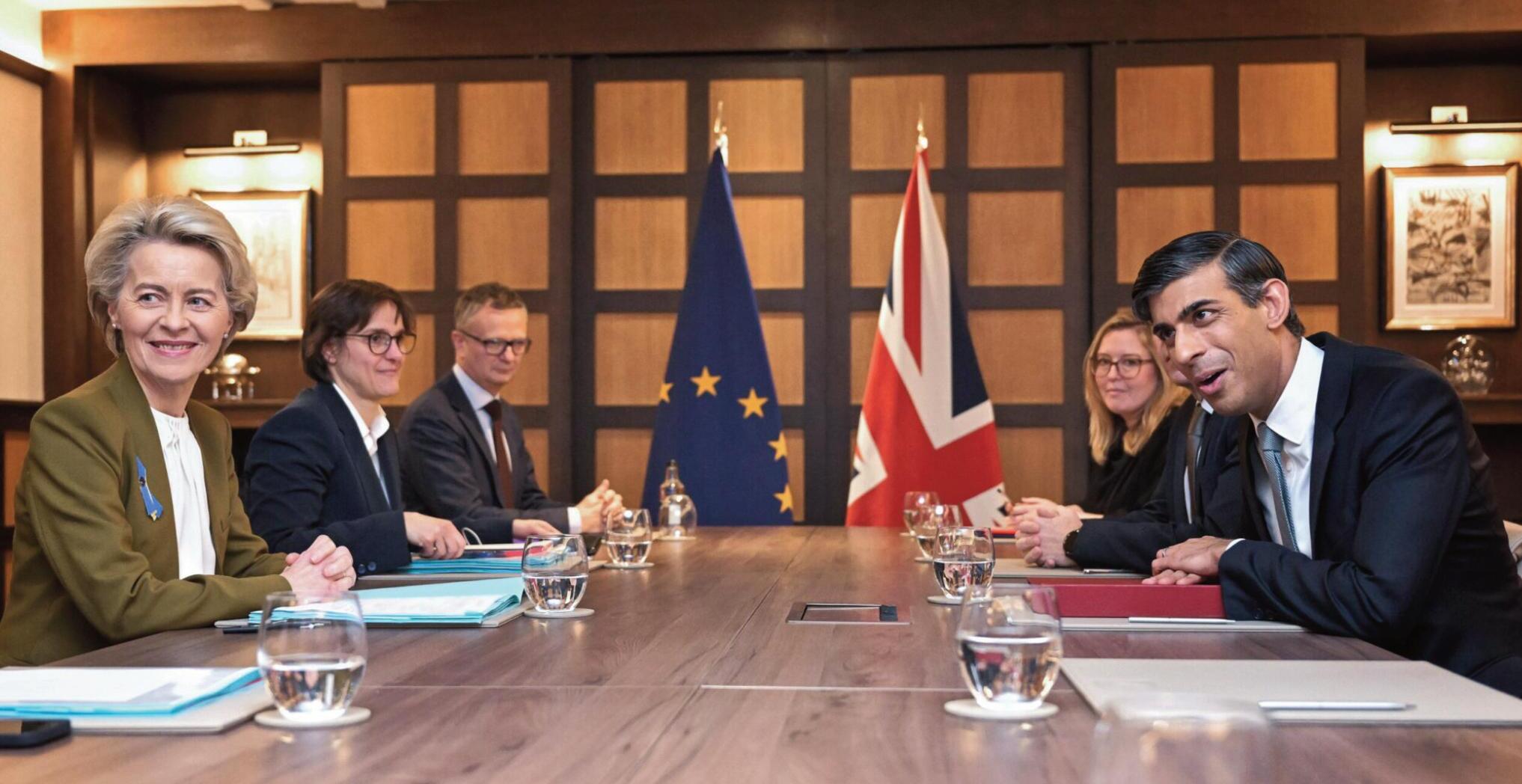
The IMF predicts that the UK will have the longest and deepest recession of any major Western economy. Likewise the war in Ukraine is acting as a pressure for “western unity” against China and Russia. Being drawn into a trade war against the EU would be a nightmare for the British economy and run contrary to a united western bloc. However, the issues surrounding trade and checks on goods do not go to the heart of opposition to the protocol. Rather, it is the placing of a border that divides Northern Ireland from the rest of the UK. Northern Protestants feel they are being pushed towards a united Ireland against their wishes.
This tension between the interests of big business and the support base of the DUP places it in a weak position. It is unable to satisfy its support base and appease the interests of capitalism. As it attempts to straddle these competing interests the space for more hardline forces to develop is growing.
The Loyalist Communities Council (LCC) has warned of being unable to “hold back” a younger, militant section of paramilitaries. And the increase of paramilitary violence is becoming more apparent day by day.
The UDA feud in Newtownards speaks to this reality. Masked men patrolling the streets, multiple petrol bomb, pipe bomb and gun attacks, over 30 families have already fled the area. It is reminiscent of scenes from the 1980s. The press have reported this as largely being a feud between rival drug gangs and that is undoubtedly an important aspect of it. However this is also an element of UDA leadership cleaning house and ousting the worst excess of criminality from its ranks. That the so-called “real UFF” have issued threats against Jamie Bryson
speaks not only to a battle between outright criminals for control of the loyalist paramilitaries but also reflects the political conflict for control between forces in loyalism. The redevelopment and rearming of Loyalist paramilitaries is a real threat. They are building in the context where the mainstream of political unionism, the DUP, are unable to adequately articulate a way to defend Northern Ireland's position in the union.
There is an urgent need for workers and young people to build an alternative that can challenge these organisations. Hundreds of women in West Winds, Newtownards organised a “walkabout” in protest over the UDA feud in that area. Such initiatives show the potential of communities to challenge paramilitaries and those who wish to drag us back.
Will Stormont return?
This side of the local elections Stormont will not be restored. The DUP will be looking over their shoulders at the threat posed from the TUV and other more hardline unionist forces. Looking past May 18 the ability for the DUP to restore the institutions without risking a split in their own ranks and undermining their support base seems marginal. In this context discussions about the future of the GFA are rampant in the press.
While there can be understandable frustration at the lack of Stormont when workers are told that pay rises cannot be secured and budgets must be cut in its absence, its return is also no real solution. This is the same administration that oversaw decades of austerity, cuts in real wages and attacks on working-class communities. Waiting times for the Northern Trust are by far the longest across the UK. Low-wage earners in Belfast are 10% poorer than our counterparts in the rest of the UK.
Unionism's alternative to the framework centres around proposals from the Westminster think tank ‘Center for the Union’ backed by the DUP, TUV and key loyalist figures. Its solution amounts, to moving the responsibility of checks onto the Southern government. This would create a border between north and south. This is no solution either. It would act only to enrage the Catholic population, to see a physical manifestation of them being beleaguered inside the Union. The truth is that placing a border anywhere, either in the Irish Sea or on the island, is a recipe for increased tensions and conflict.
Instead we need a fundamental break from the politics of Green and Orange. Sectarian politics and division find ample kindling in the conditions of poverty that capitalism in Northern Ireland doles out. It is not a coincidence that paramilitarism finds its strongest expression in deprived working-class areas that have been particularly left behind by the peace process.
The unity we have seen on the picket lines of recent strikes in the private sector and across the NHS and other public sector workplaces demonstrates where a solution can be found. Thousands of workers have stood together united in common cause against the employers and the government. This power should be harnessed and channelled to challenge the forces of sectarianism.
The trade union movement should not wait for further escalation by sectarian forces. Unions currently engaged in struggles should organise anti-sectarian conferences to discuss how we can build a political alternative to the sectarian status quo, including clearly opposing any ‘solution’ to the border question that would inflame sectarianism.
Most importantly, it means there is an urgent need to build a cross-community party based on workers and young people in all working-class communities, with anti-sectarian and socialist politics. Only in this way, on the basis of mutual respect and solidarity, can we find solutions to issues that divide people.
May are happening in the context of ongoing political crisis at Stormont and continuing strikes in both public and private sector workplaces. Two young trade union activists and Socialist Party members will be offering a socialist alternative: Amy Ferguson (Omagh) and Neil Moore (Botanic, South Belfast). Both are campaigners against gender violence and transphobia and activists involved in environmental struggles.
Trade union activists
Amy and Neil have experience in organising workers including in precarious industries like hospitality with a record of innovative initiatives for example organising against sexual harassment in hospitality. They are raising the need for socialist policies in their campaigns including calling for the nationalisation and democratic running of energy and food companies - an essential move to end the profiteering. Research by Unite the Union shows that in 2022 food inflation added an estimated £837 to average UK household bills while the three largest supermarket chains increased their profit margins in the first 6 months of that year by 89% in comparison to pre-covid levels.
The ongoing decimation of public
services by the Tories but also parties in Stormont and local councils is another issue being highlighted by both campaigns. Combining full support for workers engaged in struggles over pay, terms and conditions and in defence of public services with clear calls to coordinate struggles and unite workingclass people from Catholic and Protestant backgrounds Amy and Neil are demonstrating the type of struggle that is required.
Socialist feminists
With the right-wing transphobic & anti-feminist backlash in full swing, we
need socialist feminism now more than ever! Amy and Neil, both supporters of ROSA, the socialist feminist movement, have consistently campaigned for abortion rights and access. They have been part of organising against gender violence both in workplaces and through campaigns and protest actions such as participating in standouts against gender violence and LGBTQphobic violence.
Socialist feminism means recognising that our struggle to end gender violence, racism, transphobia and all oppression must by necessity be an anticapitalist struggle; because the system
not only benefits in various ways from divisions amongst us, but also because capitalism is inherently exploitative, divisive and violent. Changing the entire system requires active movements of solidarity and struggle of working-class people of all genders.
Reject dead end of sectarian politics
Neil and Amy also stand for uniting all of the struggles in a common movement of young people and workers from Protestant, Catholic and other backgrounds. One important step in this is the creation of a new party on a real cross-community basis that can be

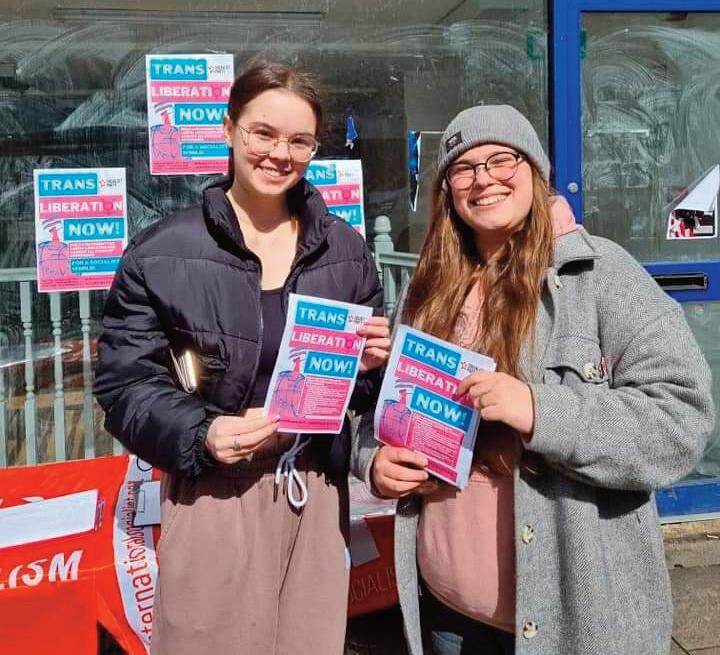
a political voice for working-class people here. Such a party can be built from existing campaigns and those that will continue to emerge on issues of the climate crisis, gender violence and oppression and crucially linking with existing and new trade union activists across different sectors. Such a force will be a strong threat to both Unionist and nationalist parties and be an important step towards providing a real alternative to the sectarian dead-end.
Use your vote but also: help us build a socialist alternative Local elections can be an important opportunity to reject the capitalist and sectarian status quo on offer by the main parties. If you live in Omagh or the Botanic, please vote #1 for Amy and Neil. In other areas we would encourage you to vote for any other genuinely cross-community, socialist candidate. The local elections will not solve the issues we face: from poverty wages and the exploitation of workers to oppression and gender violence, to climate destruction. To achieve this you need to get active in the urgent struggle to build a movement to not just challenge the worst excesses of greed and capitalism but to build a completely different society. Only on that basis can we find solutions to the burning issues that we are confronted with including the climate crisis and ongoing sectarian division.
IN APRIL, the media was buzzing with excitement as US President Joe Biden, along with Bill Clinton and Tony Blair, visited Belfast for the 25th anniversary of the Good Friday Agreement. Biden was presented as some sort of celebrity, rather than the figurehead of US Imperialism. His role in escalating tensions in the Cold War with China, approving a disastrous new oil drilling project in Alaska, or bailing out another huge bank with public money while living standards and infrastructure in the US deteriorated, were all ignored while pressing questions such as which airport he was flying into made headlines.
25th Anniversary of GFA Clinton and Blair's visit centred around Queens University's "Agreement 25" conference. Along with Senator George Mitchell, they are constantly presented as having some vaunted role in the peace process here. They love to pat themselves on the back and indulge in limitless credit for the peace process - as if they came over here and sorted out all our problems for us. Exactly what indispensable role they are supposed to have
played is never made clear. On the other hand, the role of working-class people across the North is ignored, even though strike action and mass demonstrations against sectarian attacks were the real motor that forced peace on the agenda.
In reality - these figures don't care at all for the interests of working class people in the North. Their interests, then and now, are aligned with the interests of the rich and powerful, big business and multinational corporations.
Warmongers not welcome Biden himself spoke of his commitment to "peace and prosperity" in a speech at Ulster University that would turn your stomach, attended by the leaders of the main Stormont parties. The past 25 years have been years of unchallenged US world domination and Biden has shown himself at every point along the way to be a blood-thirsty warmonger.
This month marks the 20th anniversary of the US-led invasion of Iraq. As the US government lied to the world and laid waste to a nation, Joe Biden was one of the leading pro-war voices in the Democratic Party. While he was Vice President, the Obama administration led a series of equally disastrous interventions in Syria, Libya and Yemen.
Biden, Clinton and Blair are amongst the world's most ardent enemies of peace. It is sickening to watch them use the North to launder their reputations.
Once all the warmongers were in attendance, the celebrations could begin. But the whole thing felt more like a fairly grim wake, given the reality of where the dysfunctional political system that the Agreement set up is today. Stormont is in a perpetual cycle of collapse, the sectarian temperature is rising substantially and paramilitaries are once again beginning to assert themselves on the streets. What was never really mentioned beneath all the platitudes was that power sharing was never based on a real coming together of ordinary people in society. Instead, it was an arrangement by which sectarian politicians would oversee and maintain division, carving up communities along sectarian lines. Peace walls, segregated schools and housing have all been strengthened under this system.
The so-called "peace dividend" that was promised to working class people never came. Years of brutal austerity, wage stagnation and a proliferation of low-paid jobs mean that 25 years after

the Agreement and countless working class people live in poverty - a crisis deepening with rising rents and a skyrocketing cost of living.
Many young people on social media pointed to the emptiness of these celebrations, pointing behind the empty words of "progress" to the grim reality of living here: no jobs, no
affordable housing, no prospects. In the 25 years since the signing of the agreement more people have died by suicide than died during the Troubles. Biden may have mistaken the luxurious heights of his room in the Grand Central Hotel as "prosperity", but for the majority of people here such an idea is frankly insulting.
completely subservient to them. Trad wife culture is dominated by antiabortion, anti-birth control, transphobic and anti-sex views.
The ‘tradwife’ has arisen alongside and is a part of a growing sexist, reactionary backlash against the gains of the feminist movement over the last decade, with attacks on abortion, trans rights, and the misogynistic vilification of women who speak out against gender violence and harassment. There are also links between Tradwife rhetoric and ultra reactionary ideology like evangelical white nationalism in America, and the views of Andrew Tate.
By Eva MartinMY
SOCIAL media newsfeeds, like those of other young women, are increasingly flooded with videos of women, in their early 20’s, in floaty 50’s aesthetic dresses, with perfectly done makeup and hair whilst baking, cooking or carrying out domestic chores. These videos are normally captioned ‘a day in the life of a stay at home girlfriend’ or ‘ my life as a trad wife.’
Whether it's a ‘day in the life’ video, influencers extolling ‘perks’ and ‘freedoms’ of giving up working and opting instead for financial dependance on a partner, or discussing the liberating qualities to fulfilling a womans ‘natural gender roles’ - tradwife content has taken TikTok by storm.
But what is a Trad wife? In the words of a self proclaimed high profile trad wife: “women who choose to live a more “traditional” life with ultra orthodox gender roles. The man goes
 By Hannah McGirr
By Hannah McGirr
ON TUESDAY 4 April 2023,
Geila Ibram was brutally murdered in Limerick, making her the third victim of gender violence in Ireland this year. Since the highprofile case of Aisling Murphy’s death in early 2022, 14 more women have died from gender violence on this island. These deaths incite communities to come together and mourn at vigils and protests, which are often attended by politicians eager to relay their so far empty promises for change. The Northern Ireland assembly has yet to begin implementing an official strategy to combat gender violence.
In Northern Ireland in 2022, there were a staggering 32,941 cases of domestic abuse incidents reported, an increase on the previous year. There were also increases in domestic abuse crimes in nine out of eleven policing districts. The cost-of-living crisis has put many domestic abuse victims in the terrifying position where they are forced to choose between staying in a dangerous situation or risking poverty and possible homelessness.
In March last year, after a heroic twelve week sit-in, the workers of the Regina Coeli women’s hostel closed its doors following the Housing Executive’s promise of new improved services, set to open a few months later. A whole year ahead, in March 2023 its replacement Catherine House finally opened. The delayed services have room to house only 10 women, making this a fraction of what was promised by the Housing Executive. The Regina Coeli hostel was capable of housing up to 21 people, despite this there is no indication of any more housing or services in the works to support the vulnerable women of Belfast.
Gender violence is an insidious tumour in our society. Change will not come when the government continues to drag its feet on delivering life saving funding, support and housing to women and non-binary people in need. We must build a strong, organised, socialist-feminist movement to fight oppression in all its forms. Nobody should have to live in a state of fear or intimidation, this is what we fight for.
outside the house, works, provides for the family. The woman stays home, and is the home maker, she also takes care of the children - if there are any. Trad wives also believe that they should “submit” to their husbands and “serve their husbands, and family." Whilst the content of a lot of these videos appear seemingly mundane, the ideology behind the trad wife movement is sinister. The Tradwife narrative plays into the idea that women are the property of their husbands, wholly and
Of course many are longing for an alternative, literally any alternative, to the exploitation and discrimination on offer by capitalism. There is a desire for stability, care and security. But the fantasy being sold by ‘Trad wives’ of this idealised past where middle-class women lived the ‘suburban dream’ is exactly that – a fantasy. The post-war era saw a huge rise in propaganda pushing the idea that a woman’s fulfilment was rooted in her ‘innate’ roles: being a housewife and mother. But the high levels of addictions to valium and other anti-depressants during this time period paint a different story. The idea that the returning to ‘traditional values’ and rigid gender roles is the antithesis to exploitation, discrimination and alienation, or a logical alternative to the offers of neoliberal/girlboss feminism, is incredibly misguided and harmful.
The co-option of feminist language
by the Trad wife movement, framing the decision to become a Trad wife as a liberating ‘individual choice’ to opt out of the labour market and be entirely financially dependent on your partner obscures reality. For the majority of women and families, opting out of working has never been a choice. The dire lack of childcare, particularly in countries like the UK, where capitalism has eroded the welfare state away to the bone, means working class women are often forced out of their jobs in order to take on caring duties for children and elderly relatives. And what of the families who cannot stay afloat without the extra income? Or single parents? They have no choice but to return to work in a cruelly short amount of time after giving birth, and then find themselves stuck in the vicious cycle of working to pay for extortionate childcare costs to stay afloat.
Financial and economic control is also a key aspect of coercive control, and this abuse seldom happens in isolation. Being wholly or completely reliant on a partner to live opens the door for further abuse.
Notwithstanding the prevalence of trad wife content on social media feeds of young women the opposition to any attempts to restrict our rights and freedoms continues to grow, particularly among young women and queer people. The need to actively challenge the entire system is evident if we are to eradicate the repressive expectations of capitalist society. Socialist feminist ideas are therefore essential in this struggle.
THE MARCH 2023 budget was much of the same from the Tories - working class people paying while the bosses and billionaires are enriched. However, many saw a glimmer of hope in the form of extended free childcare. The reality is that these measures fall far short of what is required. Means testing immediately demolishes the idea that this is somehow "free childcare for all".
Furthermore, the policy lowers standards by reducing legally required adult:child ratios. The plan to offer wraparound school care, through after school clubs etc. is unfunded. The treasury stated that: “we expect that most schools will be able to deliver before and after school provision selfsufficiently”. They provided the example of provision being “funded by parents”. Openly admitting that the plan is to push costs onto parents! Finally these provisions are term time only - 38 weeks/year.
The Tories have not delivered this meagre package out of kindness. Studies suggest that the huge expense of childcare prevents about 1.7 million women from taking on more hours,
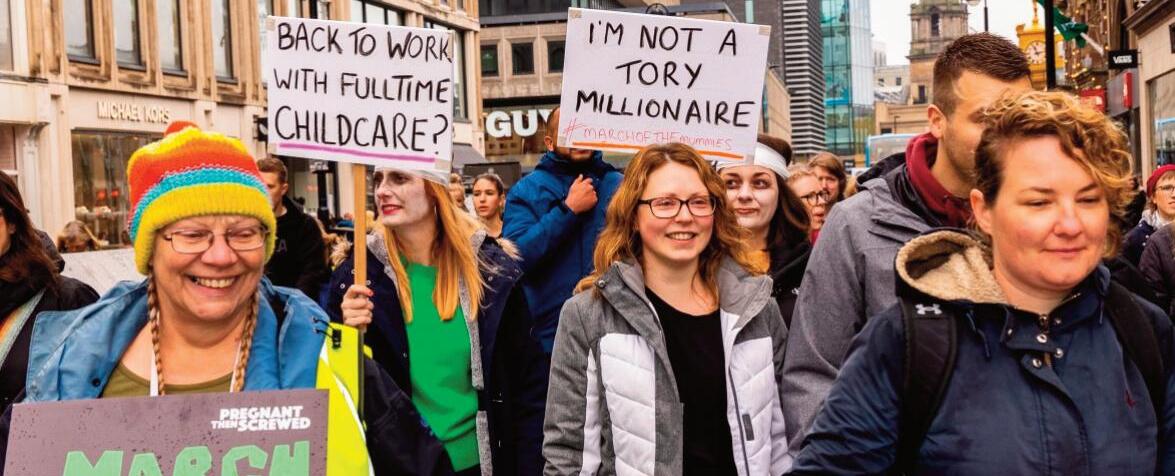
equating to more than £28bn in lost economic output each year. Labour shortages are hitting the bottom lines of many companies. The Tories proposals are due to desperation on the part of the bosses, not out of any sense of kindness or compassion towards working-class families. But of course, these provisions don't extend to Northern Ireland. As limited as the reforms are, no parents here will receive such support. Whether fulfilled by childcare professionals or parents, the goal is to raise children to be healthy adults. The cost of living crisis means more and more families struggle to meet their children's basic needs. Childcare providers are also finding it increasingly difficult to deliver adequate lev-
els of care. Private childcare enterprises prioritise profits over the quality of service. Usually charging exorbitant prices while under paying and overworking staff. The sector is in crisis as they struggle to meet staffing levels and many childcare facilities are on the brink of closure.
The childcare system that allows parents to find a work-life balance is radically different from what the Tories offer. Working-class people, women in particular, need a publically ran system free at the point of use, paid for by those who can afford itthe millionaires, billionaires and bosses, Those families for whom such arrangements don't suit, should be supported financially to allow a life of decency and opportunity.
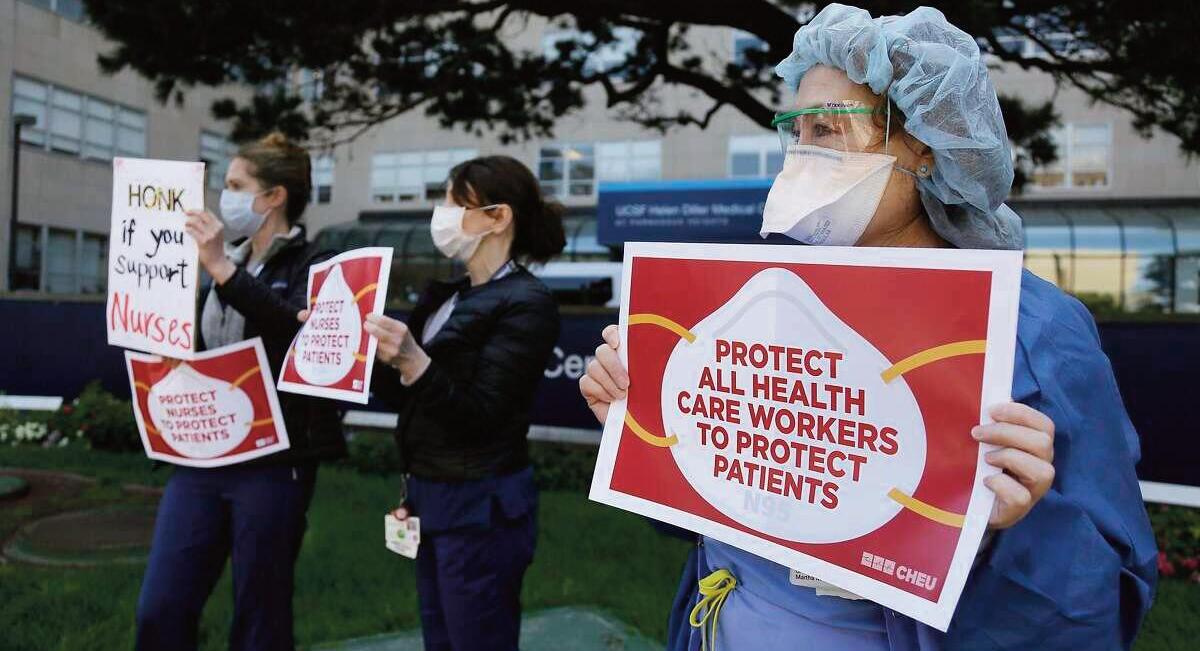
some of the most prominent health unions have failed - first calling off action to enter talks, letting up the pressure on the government and then recommending a bad deal. Undoubtedly this will put intense pressure on health workers who’ve already taken a number of days of strike action and lost pay in the context of a huge spike in living costs. Even unions like Unison which accepted the Barclay deal 47% of members didn’t vote and nearly a quarter rejected the deal against the advice of their union.
the significant mobilisation and confidence of workers in their struggle have been the presence of mass strike committees that involve all workers and give them a say and input into their own struggle. This can be replicated here.
Don’t let NI politicians off the hook
AS HUNDREDS of thousands of health workers continue to take strike action in the fight for a pay increase that exceeds inflation and address the chronic understaffing and resourcing of the health service theSocialist looks at what’s necessary to win this titanic battle.
Health workers from a variety of unions in England including RCN,
BMA, Unite and GMB have continued the campaign of industrial action in opposition to a Tory government intent on forcing workers to accept a real term pay cut. Inflation is projected to remain high and looks likely to continue into the future while the crisis in the NHS intensifies with substantial underfunding and a Tory privatisation drive it’s clear the campaign by health unions is
more important than ever before. Arguing for what is necessary and carrying it out will be essential. The thoroughly discredited Barclay deal would have seen health workers get an effective pay cut with no redress for historic pay losses while only paying lip service to addressing the crisis in the NHS by the architects of the very same crisis! It’s clear to date the leadership of
The seismic vote in the RCN against their leadership combined with the escalating action being taken by Junior Doctors in particular can play a role in reinvigorating action. Now more than ever health unions need to link up and coordinate action to have the largest effect including no involvement of trust management in any derogation and mass assemblies of health workers in every hospital, across unions to discuss and agree the way forward. In the recent strike wave in France a key reason for
It’s clear the 26 April strike involving civil servants and education workers will bring pressure to bear on the Stormont politicians and the NI Secretary of State. The absence of an NI Executive hasn’t stopped either the increasing bills hitting our inbox or the Tory government’s representative hosting US presidents both past and present with an immense security budget. Health and public sector workers could force a pay rise agreed by the main parties and rubber stamped by the Secretary of State but instead the political strategy is to allow the local parties to wash their hands of it and ends up another stick for the Tories to use to force the DUP back into government.
Another pay increase
By Roise McCannTHE12 May is International Nurses Day. It is taking place in the same year that health workers across the UK were at the fore of a wave of industrial action taken to demand inflation-busting pay rises, safe staffing, and defence of the NHS from impending collapse fueled by Tory privatisation.
The disparity between the crucial role of health workers and the realities of their dissipating pay and working conditions have never been as stark. Health workers shouldered the enormous burden of keeping the deeply broken health system afloat during the Covid-19 pandemic through significant personal sacrifice and extra hours worked without pay on the good will of workers. The
majority of health workers are women, who disproportionately bear the brunt of billions of pounds worth of society’s informal and unpaid care work making women nurses some of the groups most reliant on food banks as the cost of living crisis continues to spiral.
Luckily, we have Tory ministers to remind us repeatedly in the media that nursing is a “vocation”, that nurses should not complain about meagre wages or wards staffed by a couple of colleagues, and they certainly should not go on strike. Healthcare workers responded by coming out in their hundreds of thousands to fight for pay rises that would help restore safe staffing levels. Cuts to life saving services that have created longer waiting lists than ever for service users. Health workers have had enough; in taking
industrial action many workers have connected the struggle for better pay and conditions to the fight for their patients and against the rampant privatisation of the system.
While pay offers on the table of 5% represent progress for many workers, it falls short of what is necessary to restore pay to 2008 levels. Junior doctors on strike in England have demonstrated the decimation of health professionals’ wages by demanding a 35% pay increase to restore wages to where they were in 2008.
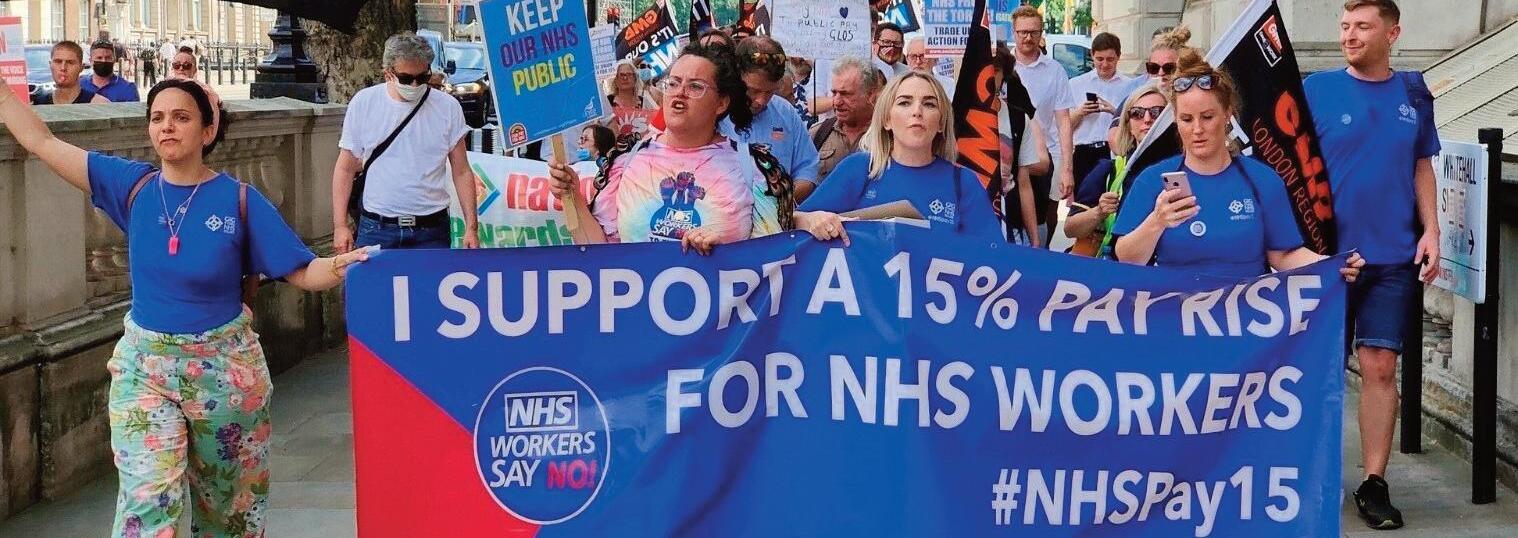
Join us for a day of action on 12 May for International Nurses Day, to mobilise health workers, working people and young people looking to struggle for genuine change that offers dignity for health workers and service users alike.
FOLLOWING THREE days of strike action, Kingspan Water and Energy workers have won a one year pay deal of 10% across all grades, backdated to January, as well as a £1,000 one-off payment. This workforce, made up of multiple nationalities, and organised by Unite and Socialist Party member Neil Moore, fought an impressive battle against their bosses’ divide and rule tactics.
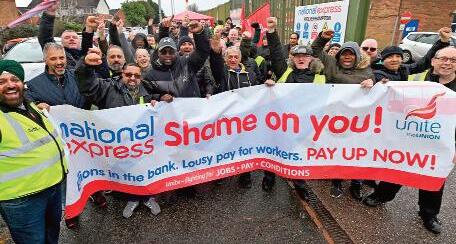
Not only did the company try to treat office staff and shop floor workers differently, but they also tried to fly in scab labour from Poland. Many of these workers would not have heard of the dispute. In response, the workers put out a message appealing to the Polish workers (in Polish) to not cross the picket line, to see that a victory in the dispute would be a victory for all workers. The point was made that their struggle for a fair livelihood in Poland was the same as that of the workers on strike: to fight against the greed of the capitalist class that is the cause of so much hardship among the working class, no matter where we live or are from.
Similarly, National Express West Midlands bus strike came to an end with the acceptance of a one-year 16.2% pay increase and improvements to the drivers’ accident pay and Christmas pay rates, as well as a guarantee to implement terms and conditions that were agreed to last year. These workers also had to put up with bullying, intimidation, and divide and rule tactics by their employer, including dragging individuals into one-to-one meetings to try to break down their support for strike action, undermining democratic processes, and threatening strikers with no future overtime. The workers stood strong in their resolve and maintained unity by setting up a unionbusting hotline to assist all workers who were subjected to such tactics. As workers are getting organised and taking action, the capitalists are rattled. In the near future we will likely see more divide and conquer strategies being unleashed upon workforces. Such tactics can be overcome, and genuine pay rises won, with militant organising strategies, including those mentioned, as well as coordination between workforces and sectors.
AN EXPLOSIVE revolt in France began on 19 January 2023, MYRIAM POIZAT reports. The French government announced its proposal to raise the pension age from 62 to 64, and with that hundreds of thousands of working-class people took to the streets in an outpouring of furious opposition. In the context of a deepening cost of living crisis, this reform was but the tip of the iceberg. A bitter struggle against Emanuel Macon, the infamously titled ‘President of the rich’, was underway.
F OR MILLIONS facing worsening working conditions and living standards globally, lessons should be learnt from this movement, now entering its fourth month.
An injury to one is an injury to all
While only 10% of French workers are unionised, the anger and pressure from below forced conservative union leaderships into forming an inter-union structure to coordinate actions. This helped organise the significant strike of 3.5 million on 7 March – a number that officially qualified it as the second biggest strike since 1968.
Confidence among workers quickly grew as striking energy personnel took ‘Robin Hood’ actions which coordinated the distribution of free gas and electricity for schools, hospitals, social housing, public sports centres and public interest associations across the country. Supply was also restored to users disconnected due to unpaid bills, and the workers offered a reduced rate of up to 60% for small traders – help they would have never received from a government protecting the big companies’ rising prices and profits.
These workers’ actions gave a glimpse of the type of society that could be built through democratic workers’ control of resources. But they were also part of
building real solidarity among all sections of the working class, as the responsibility for the current crises was shifted away from oppressed groups towards a regime and a system that serves only the interests of the ruling class; sexist, racist and transphobic attitudes have been challenged concretely.
International Women’s Day
This led to unions and feminist organisations joining forces on International Women’s Day to call a feminist strike. This significant action exposed the disproportionate impact of the pension reform on women – with gender roles often forcing them to work part time or interrupt their careers to care for children or elderly relatives, and the precarious and lower-paid jobs in female dominated sectors. As a woman on strike reported to the media: “I started working two years before my husband, but I will have to keep going after he’s retired.
That’s why I’m angry.”
But the 8 March strike went even further with demands against the rightwing backlash, the increase in gender-based violence and the attacks on abortion rights worldwide. The reason is simple: the struggle concretised the crucial need and real potential to challenge backward and misogynistic attitudes within society and within the movement to unite all
working-class people in a common struggle against a common enemy and win change for all.
The Macron government’s weaknesses were quickly exposed. Its inability to rely on the support of traditional parties to back it up forced it to utilise, for the 11th time in less than a year, Article 49.3 of the French Constitution. This infamous article allows the government to pass legislation without taking a vote in the National Assembly.
Such an authoritarian move unsurprisingly added oil to the fire, inflaming the social movement, to which the French state responded with escalating police brutality. A protester from Sainte-Soline is currently clinging to his life in intensive care after cops savagely beat him and stopped paramedics from intervening. Many women have reported being verbally and physically assaulted, having their hair pulled during protests, and experiencing molestation during arrests.
In times of crises and instability, class struggles like the one taking place in France are a real threat to the system. In response, particularly in the French state, we often see increased state power being centralised around one leading political figure. This has led protesters to portray Macron as the wannabe King of France and reference Louis XIV’s notorious statement ‘l’Etat, c’est moi’ (I am the state).
Yet, determination in the struggle is not backing down. If anything, the increase in undemocratic measures and violence from the French state has reinforced the movement by bringing more young people out onto the streets. Students, who were at the forefront of explosions like #metoo and #blm, rejecting oppression and police brutality, have now begun organising in their schools and colleges in support for the workers’ struggle against the Macron regime.
This is a significant step forward. In the absence of clear strategy from the union leadership, a perspective for victory can be questioned. However, the growing presence of young people, the most radical section of society, can add confidence for workers to put pressure on their union leadership, move away from negotiation processes with the government and into further escalating actions in the workplace and the street.
For a workers’ government
Like the ones organised by energy workers and binmen recently, all other workers should coordinate renewable strike actions and build towards renewable general strikes. To do so, it is vital that they organise ‘anti-Macron’ strike committees in all schools, universities, communities and workplaces that can form local, regional and national assemblies to democratically discuss the demands and next steps of the struggle. Such committees could also lay the basis to scrap the undemocratic Fifth Republic of the rich and create a truly democratic revolutionary Constituent Assembly.
This is a necessary step towards a socialist government and socialist policies that seize the resources from the superrich and big business and bring them into democratic public ownership under workers’ control and management. A democratic, socialist France would be a beautiful beacon of hope for revolutionary change in a world of exploitation, climate catastrophe and oppression.n

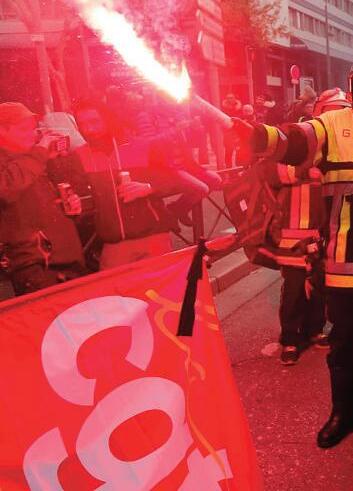
NO SOONER had Israel’s new far-right coalition, headed by Benjamin Netanyahu, been elected at the end of December than it introduced proposals to curb the powers of the Israeli Supreme Court. By allowing the Knesset (Israeli Parliament) to overturn decisions of the Court by a simple majority of 61 (it has 120 members) and giving it a greater role in the appointment of the Court’s judges, Netanyahu and his cronies hope to centralise greater power at its expense.
This has led to an unprecedented explosion of protests in Israeli society. Since the beginning of the year, weekly street protests involving hundreds of thousands have taken place, including militant tactics such as the blockade of roads, all of which culminated in a historic general strike on Monday, 27 March. This strike resulted in Israel’s ports being shut down, planes being cancelled, and universities, shopping centres and Mcdonald's restaurants closing. Strike action was even taken by staff in the Israeli state’s embassies across the globe.
The significance of such polarisation within a state that is such a key ally of US imperialism, and one that metes out such brutal oppression to the Palestinian people should not be understated.
The Biden Presidency has put pressure on Netanyahu to drop his plans fearing the instability that can undermine its “strategic asset” in the region. More generally, it is indicative of a wider po-
litical, economic and social crisis facing the system of capitalism globally in what is now an age of permacrisis.
The Israeli Supreme Court is not an institution of humanitarian progress, contrary to the view expressed by its liberal capitalist supporters both within Israel and beyond. It is part and parcel of the Israeli ruling class and the state’s apparatus of oppression, particularly against the Palestinian people. It has given legal cover to housing demolitions, torture and the building of colonial settlements on occupied Palestinian land. Yet Netanyahu and his allies in the government see this court as an obstacle to implementing its policies of attacking the rights of LGBTQ people and refugees, and going further in terms of the expansion of settlements and annexation of Palestinian land. Many of the protesters have drawn comparisons between Israel’s new government and farright regimes that have taken power in Hungary and Poland in the last decade, which have trampled on the rights of women and LGBTQ rights.
The scale of the protests and the 27 March general strike forced the Israeli government to temporarily suspend its proposals. However, it now has plans to set up a new “National Guard”, at the behest of the Italmar Ben-Gvir, the deeply racist National Security Minister. This will act as a kind of paramilitary


and pogroms of Palestinian towns such as Nablus and Jenin. Last year saw the highest number of Palestinians killed since 2002 in this part of Palestine.
However, this has been met by mass resistance from a new generation of Palestinian youth, with the calling of general strikes and mass protests in the Occupied Territories as well. This offers a real potential to organise a grassroots movement from below based on democratic councils of struggle organised in workplaces, universities, towns and cities. Such a movement could organise a revolutionary struggle that offers a real challenge to the occupation.
organisation to quash any potential opposition to the racism, dispossession and discrimination meted out by the Israeli state towards Palestinians living within its pre-1967 borders. Ben-Gvir is a prominent spokesperson for Israeli settlers in the occupied West Bank and East Jerusalem and has been charged with incitement to hatred against Palestinians within Israel’s “green line”, its officially recognised borders.
On Sunday, 2 April a general strike took place in the major Palestinian towns within Israel in the wake of the cold-blooded murder by Israeli police of the 26-year old Mohammed Khaled Alasibi, a Palestinian Bedouin at the entrance of the Al-Asqa Mosque in occu-
pied East Jerusalem. This saw the shutting down of schools, post offices and banks, combined with mass protests in Galilee, the Triangle and the Negev. The murder of Alasibi is a by-product of the increased repression that is doled out to Muslim worshippers annually at the AlAsqa Mosque, the third holiest site in Islam, during Ramadan. On Wednesday, 6 April, Israeli police brutally raided the Mosque and arrested hundreds of Palestinian worshippers.
There has also been a marked stepping up of repression of Palestinians in the occupied West Bank, 94 have been killed by the Israeli Defence Force and colonial settlers in 2023 alone. This has been combined with the increase of raids
Socialist change needed Socialist Struggle Movement, our sister organisation in Israel/Palestine, has participated in the historic mass protests that have overrun Israeli society. We have argued that this movement must be independent of the “liberal” section of the Israeli ruling class and argued it must stand against the occupation of Palestinian land and the oppression of Palestinian people generally.
The working class and oppressed within Israeli society have no interest in maintaining Palestinian oppression and should break with the Israeli ruling classes’ Zionist chauvinism and its rule generally. National liberation, justice and democracy will only come about with the overthrow of Israeli capitalism, and the economic and political order of capitalism and imperialism generally in this region.n
By Bryan Koulouris, Socialist Alternative USSOCIALISTS CERTAINLY won’t shed tears if Trump sees the inside of a prison cell. Trump, along with other billionaires and presidents (from both parties), should be tried for his countless crimes against humanity. Trump won’t be in jail for the 2024 election, and the rightwing fervour he’s come to represent will continue. The legal system won’t save us from Trumpism; we need a mass working-class movement against the billionaire class, racism, and sexism that can challenge both parties and the capitalist system they represent.
At the same time, we need to keep a close eye on these Trump indictments (there will be more!) because they will affect the terrain of U.S. politics. Pro-capitalist liberal media outlets like The Economist are running headlines titled “Prosecuting Donald Trump over Stormy Daniels looks like a mistake.” They claim the legal charges against Trump are weak in this case, that no legal indictment will stop Trump from running for President again, and that this puts Trump’s Republican rivals in a difficult position.
They have all rallied to support Trump against the legal system. An indictment around Trump’s business practices (which could actually cut across his base somewhat) would be difficult for both parties because most politicians are connected to corrupt corporate dealings, from insider trading to collecting funds from taxdodging billionaires.

The biggest crimes
Trump has been committing crimes for decades, from the serial sexual assault of women to his shady business practices. He hasn’t seen jail time because the legal system is rigged in favour of the super-rich and against workers, the poor, and especially Black people. The daily criminal activity of the wealthy and powerful is “perfectly legal” as they destroy the environment, exploit workers, wage war, and dodge taxes in the pursuit of ever-growing piles of cash. Trump bungled the onset of the pandemic, denying it had even come to the U.S., resulting in the needless deaths of thousands. He also encouraged a widespread increase in racist and sexist attacks, whipping up hatred and laying the basis for the dismantling of abortion rights and anti-immigrant policies, all ‘legally.’
While Trump’s anti-immigrant rhetoric was worse than other modern presidents, his policies were actually a continuation of Obama, who deported more immigrants than any U.S. president ever.
Even when Democrats opposed Trump, they always feared a movement in the streets and in the workplaces that could actually defeat the right wing as they held back struggle and tried to push it into “safe” channels like elections and legal proceedings. This failing strategy led to the overturn of Roe v. Wade and countless other terrible right-wing policies at the federal, state, and local levels. They’ve declared “victory” over Trump countless times now, only to be blindsided by the resilience of his support among his hard-core base.
We need an active movement to fight against right-wing attacks, particularly those against trans people who are currently being targeted by reactionary politicians. We need to rely on the strength of working people, not the politicians and the courts since both ultimately protect the interests of big corporations. With Democrats in power, right-wing populism can actually grow as people become disaffected by an administration (and their “left-wing” apologists in the Squad) that breaks potential strikes, oversees runaway inflation, and only offers shallow “woke” words instead of defending oppressed people.
Trump should be tried for his real crimes, ones that he’s been getting away with for years, and the most heinous crimes that are perfectly “legal” in a rigged system. Bush should have been tried as a war criminal instead of being paraded around by liberals as a “good” rich Republican. Democratic warmongers like Lyndon Johnson should have been punished for their countless atrocities against people in Asia. The list could go on and on because this whole damn system is guilty as hell.
The courts won’t stop Trump or Trumpism. They are only prosecuting him now because sections of the ruling class are afraid of the instability it could bring to their system if Trump got back into the White House. While we should analyse the implications of this indictment and the ones to come, we want Trump and his likes to be punished and the system of exploitation and oppression that gives birth to them relegated to the trash heap of history.


SUSAN FITZGERALD, a longstanding member of the Socialist Party has been selected as the new Regional Secretary of Unite the Union in Ireland. Unite the Union has over a million members across Britain and Ireland. Susan brings tremendous experience, knowledge and skills of organising both North and South to this role.
As a committed socialist, Susan’s politics are based on a confidence in the abilities of working-class and young people to change society. Susan believes it is essential to bring workers together in united struggles for better pay and conditions, but also in campaigns in wider society to fight for our health and education services as well as against cuts in all the essential services that working-class communities North and South desperately need. Susan understands the vital role that the trade union movement plays in uniting workingclass people across the sectarian divide.
Susan is the first woman to hold this post and as a socialist feminist and supporter of ROSA will bring her tenacity to fight to end all forms of sexism, transphobia, racism and any other form of oppression, and for LGBTQIA+
rights both inside workplaces and in society generally.
A peerless record
Susan has an important public profile as a leader of workers, for example during the Harland & Wolff occupation which saved the shipyard, or the campaign by former Regina Coeli workers for homeless services. Un -
doubtedly Susan will use her position to try to further assist workers in their struggles and campaigns, to build solidarity and challenge the conditions that the capitalist market imposes, the antics of the bosses and the attacks of the political establishment North and South.
Overall the trade union movement in Ireland, and internationally needs to
a joint struggle of all public sector workers will create an untenable situation in which the Tory government would be forced to grant significant concessions. PCS, NIPSA and Unite members should not be put in a situation where we undermine each other's industrial action because our strikes are not on the same day.
be reclaimed and revitalised by workers themselves, and turned into a growing and fighting movement in the best traditions of the pioneers who built it, such as Jim Larkin. This is all the more so in the current and impending economic context of the persistent cost of living crisis.
Unite in Britain and the North of Ireland has been distinguished in being a
trendsetter in the trade union movement in fighting for serious pay rises. In the South of Ireland Unite has been to the fore in the construction sector in particular; taking the fight to the employers to recover what was taken from workers in the course of the last crisis – without a fight on the part of the other unions which predominated in that sector in the past.
movement
Vast swathes of the private sector in Ireland, North and South, remain unorganised. The serious attack on jobs in the tech sector is a salutary lesson for any workers who thought that union organisation was unnecessary in modern workplaces.
The majority of trade union officialdom, in the South especially, remain wedded to a perspective of a return to some form of social partnership with the bosses under some future ‘union friendly’ government. This is the approach that greatly weakened the movement to begin with. Susan and likeminded officers and activists in Unite are committed to providing an alternative lead to workers based on a fighting and organising approach
CIVIL SERVANTS in Northern Ireland are on strike on 26 April.
Workers in the Northern Ireland Civil Service will be joining their colleagues in the British Civil Service and teachers on strike, to put pressure on the government to offer a fair pay rise for public sector workers.
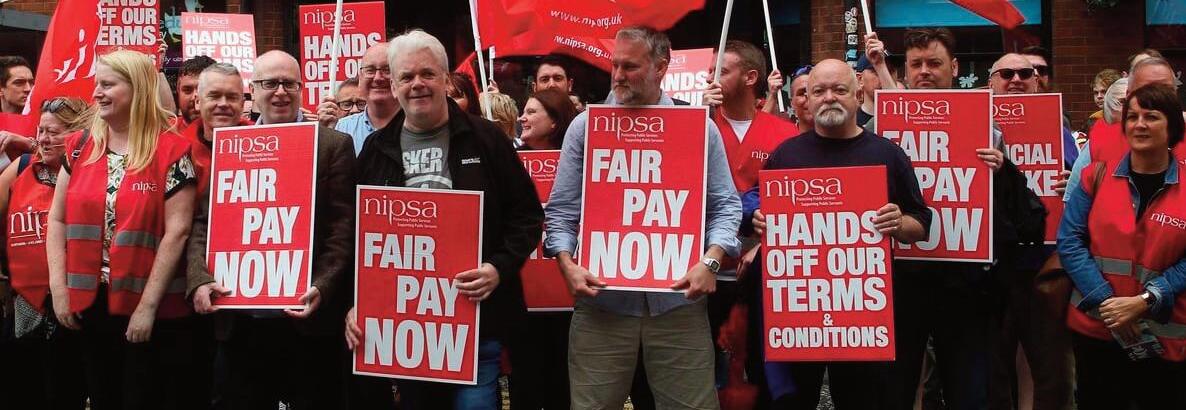
NIPSA (Northern Ireland Public Sector Alliance) completed a ballot of its members in the civil service in March that returned an 85% vote in favour of strike action and a 94% vote in favour of action short of strike action. This vote displays the willingness of workers in this sector to fight back against a real term pay cut.
The decision of the workers in the civil service to take strike action followed a measly pay offer in January by the government of £552 annually which amounts to less than a 2% increase on average for civil servants. The lowest paid civil servants will see their pay increase to £10.90 an hour, which will be just 48p above minimum wage! Inflation was at 10.1% in January, inflation for essential goods like food and fuel is even
higher. Workers are rightfully angry at the pay offer because they it is in reality a pay cut.
Public sector workers are told the money is not there for a fair pay rise but this is a transparent lie. It is no coincidence that billionaire wealth has increased by £150 billion in the last two years, the logic of the system is that the working class must pay for every crisis while the rich continue to profit from this misery.
An ambitious strategy needed to win NIPSA has called for an inflationary pay offer (10-11%) plus 5% to account for the previous pay cuts. This is basically pay restoration to 2008 levels plus a small rise. It is possible for us to achieve this pay claim but a serious strategy of industrial action is required. Sporadic strike days are insufficient. We have to maximise the power of our strike action. This means coordinating with other unions but in particular other public sector workers. Important steps have been taken by taking strike action on the same day as the PCS and the teaching unions but this could be taken further and on a more consistent basis,
A key battle ground in our dispute is winning over agency staff. There must be a conscious approach to unionise and mobilise agency workers in the civil service who now make up a large section of the workforce. There are over 3,000 agency workers in the NICS alone. This means one in every ten workers in NICS is an agency worker.
The operational aspects of the service depend on agency workers . The pay offer directly affects them but these workers are on temporary precarious contracts for the specific purpose of undermining the service we provide and undercutting workers standing up for themselves. NIPSA should actively work to bring these workers into the union on this basis and take on the profiteering agencies to end casualisation.
We cannot accept the stonewalling of our pay claim. Despite claiming that no pay increase could be awarded in the absence of Stormont, housing executive workers won a pay increase. Clearly, money can be found and made available in the absence of an executive. The improved offer came after NIPSA members voted to strike, coordinating with Unite members already on strike for 7 months. This is a key lesson for our dispute. Pay rises can be won, regardless of Stormont, if we maximise our action.
By Saana Taussi, Hospitality workerA RECENT survey by Unite showed that 90% of hospitality workers experience sexual harassment during work. To workers in hospitality, this hardly comes as a surprise, as the industry is notorious for poor working conditions.
The prevalence of zero hour contracts makes hospitality jobs extremely precarious and can make workers hesitant to report harassment. This especially applies to women workers who do the majority of temporary and part-time work. Low wages forces workers to put up with harassment from customers to avoid losing their tips. Those attending hospitality venues are not safe either - sexual harassment in nightclubs was at a 6 year high in 2022, and after the pandemic restrictions were eased, 1 in 9 women on a night out were spiked.
Unite Hospitality and Rosa have drawn together a charter against sex-
ual harassment which puts demands on employers to ensure the safety of workers and customers. This includes having effective procedures for when harassment is reported and easy pathways for reporting, as well as better training for staff. Additionally, in order to tackle sexual harassment, workers need better working conditions that will not leave them vulnerable and powerless in the day-to-day. This means higher pay, stable employment contracts,fair rotas and trade union recognition.
The prevalence of sexual harassment and the general precarity of the hospitality industry are not isolated phenomena. Bosses are driven by the profit motive; not the welfare of employees, and therefore businesses suppress pay & cut hours in order to increase the bottom line.. Workers in the industry must get organised. Asking the bosses to play nice will never be enough; only collective action will win higher pay, secure contracts and safer workplaces.
KELLIEJAY Keen-Minshull, AKA Posie Parker, brought her transphobic “Let Women Speak” tour to Belfast on 16 April. She had been forced to cancel her planned appearances in the South because of planned counter-protests. In Belfast the counter protest organised by Songs for Solidarity bringing together different LGBTQ+ groups and supporters outnumbered Posie Parker and her supporters 2:1. The protest was backed by many including some trade unions and ROSA, the socialist feminist movement.
Parker’s speaking tour has been attended and supported by neo-Nazi groups, evangelical extremists and she has previously worked with the “Proud Boys” in the US. Her recent speaking event in Melbourne attracted the support of the National Socialist Movement, a far-right group which gave Nazi salutes on the steps of the Australian parliament. Chaos ensued when Parker attempted to bring her hate rallies to New Zealand, with her 200 supporters being met by a crowd of over 2,000 counter protesters and Parker herself being doused in tomato juice and having to leave her own event and New Zealand early.
Hate and hypocrisy
These events are marketed as “freedom-of-speech” spaces to let women
voice their “concerns about gender ideology” (i.e. the existence of trans people). However this is simply a trojan horse to allow far-right, transphobic and homophobic politics gain an echo and legitimacy. Parker, like other far-right bigots, believes she should have free rein to call for violence against trans people, such as when she called for armed men to enter women’s bathrooms to “protect” cisgender women from trans women. Yet, she also thinks that we should not be allowed to oppose her.
In fact, at another event in Australia, a woman from the crowd began speaking positively about trans people and was quickly removed by Parker’s security, with one of them placing his hand around her neck. So much for “letting women speak”.
Transphobia is not only being spread by Posie Parker. The Tories have blocked Gender Recognition Reform in Scotland while in the South Fine Gael are calling for an “open debate” about trans issues. The timing of this suggestion coincided perfectly with the lifting of the eviction ban and with thousands of families facing homelessness (an issue that disproportionately impacts trans people and the entire LGBTQ+ community). The heartbreaking murder of Brianna Ghey underlines that transphobia has brutal and direct consequences.
Resistance works
The presence of trade union banners and activists at the counter protest to Posie Parker was essential. It underlined the important role that trade unions must and can play in defence of their members and in putting forward a fighting strategy for trans rights inside and outside of workplaces.
We must wholly reject the attempts to use concerns about violence against women as a way to attack trans rights. Just like racism, transphobia is being consciously injected into discussions about gender violence now in an attempt to divide and weaken our ability to fight against gender violence. Building a movement that unites the multi-ethnic, multi-gendered working
class is key to fighting for trans liberation and for women's rights including an end to gender violence.

Read more about the fight against transphboia

LAST MONTH, the Intergovernmental Panel on Climate Change (IPCC), made up of the world’s leading climate scientists, set out the final part of their sixth assessment report. But not before it was scrutinised by representatives of the UN’s nearly 200 governments, who at several points pushed for the weakening of messages on fossil fuels, and for the insertion of references to carbon capture and storage.This report will inform the next UN climate summit, Cop28, in Dubai later this year. Where nations’ progress on cutting greenhouse gas emissions will be assessed. It is clear that most governments are well off track.
In the UK, the government’s Net Zero Strategy has faced criticisms from scientists and climate change activists. There’s a total lack of investment to fund the proposed measures and an overreliance on technologies not yet rolled out or proven to work. A high court judged last July that the government’s plan was not clear on how it would reduce greenhouse gas emissions to net zero by 2050.
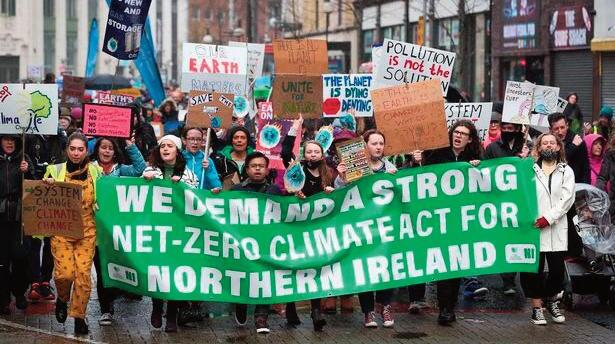
A new Net Zero plan, ‘Powering Up Britain’ published recently has again failed to convince the scientists and climate change activists. The report doesn’t lift the planning restrictions on onshore wind farms in England, thus limiting the expansion of renewable
wind energy. There is no comprehensive nationwide programme for insulation of the UK’s housing stock nor a requirement for housebuilders to fit rooftop solar to new housing. The UK continues to have some of the leakiest homes in Europe with heating in homes accounting for 14% of UK emissions. Reducing this, would not only be good for the environment but
for the living costs of working class people. From energy bills to food prices, the cost of living crisis is driven by over reliance on fossil fuel. The government had a real opportunity to kill two birds with one stone.
Instead, the main focus of the report is ‘Carbon Capture and Storage’. The government is gambling on this largely unproven technology to store carbon
dioxide in large caverns under the North Sea. Rather than using it as a temporary measure, they want to invest heavily in this technology, to the tune of 20bn, to allow for the expansion of oil and gas production in the North Sea. Music to the ears of the gas and oil companies, who are in the midst of a new licensing round, with the government offering over 900 locations for
development.
Last October, Shell admitted it had paid no windfall tax despite having made a record $30bn in profits so far. The oil company said it had taken advantage of a loophole exempting companies that invest their surplus in increasing oil and gas extraction. One potential new field, Rosebank, could benefit from an effective subsidy of £3.75bn under this windfall tax loophole. This would mean that Equinor, who made £62bn last year, would pay only £350m to develop Rosebank. These new oil fields will do very little to bolster UK’s energy security. It takes years before the first oil is extracted, the majority of which is likely to be exported.
The government's failure to fundamentally tackle climate change is not because they are uninformed or the plans ill thought out. It’s a conscious, political strategy to prioritise the interests of big business. Last year, the conservative party received £3.5m in donations from individuals and entities linked to fossil fuels, high polluting industries and climate denial. Under capitalism ‘green policies’ will always be driven by the profit motive rather than any concern for humanity or the planet. Capitalism is the cause of the climate crisis and only an overhaul of the system and the socialist transformation of society can save the planet.
SET IN a rural coastal village in Ireland in the early 1990s, God’s Creatures, starring Emma Watson as Aileen and Paul Mescal as her son Brian, gives an interesting insight into violence against women, familial loyalty and tensions, and the Irish state’s inability to protect survivors of sexual assault.
The story begins with Brian returning from Australia unannounced after several years there. The happiness expressed by Brian’s mother and sisters is contrasted with the tensions between Brian and his father.
The small village is sustained through its fishing industry in which the men fish on the seas, and the women work in the factory sorting, cleaning and packaging fish and oysters – managed by Aileen. Fungus halts labour for a period of time, as it destroys the regular oyster production. Similar to Brian’s surprising return – there is confusion as to why the fungus has returned now.
A claim of an assault is made against Brian, and when his mother is called to the station, she quickly gives him an alibi. The lies quickly impact relations in work, in public and within the family.
Sarah, the person who made the claim and a work friend of Aileen, is the real victim of small-town mentality. Her claim, when brought to court, is quickly thrown out due to insufficient evidence and the alibi provided by Aileen. The proceedings are over as soon as they began, which serves to highlight the speed at which these serious cases pass through the Gardaí and courts.
The sexual assault takes a physical and mental told on Sarah, and as a result she misses work and is subsequently fired. In addition, she is not welcome and refused admission to the local pub – as she leaves the men at the bar make sexist jokes and taunts. We get a vivid depiction of this ‘lockerroom talk’, as the men even go on to say they ‘better not follow her now’, referring to an aspect of the claim made. Not only is Sarah let down by the state, but also by the community around her who come together to protect an abuser, rather than the abused.
Marxist journal of the Socialist Party:
Includes articles on:
l One Year of War in Ukraine
l Capitalist Crisis Deepens, Fascist Threat Rises

l Extended Review: Marx in the Anthropocene by Kohei Saito
l The Good Friday Agreement 25 Years On
l Big Tech in Turmoil
l The General Strike Today
l The Toxic Ideology of the Manosphere
l Reviews of Marx’s Literary Style, The Book of Desire, Rotten Prod and It’s Okay To Be Angry About Capitalism
€4 / £4
Get a copy from any Socialist Party member or order online or subscribe at: socialistparty.ie
Brian displays no signs of regret or remorse at what he done and continues to work, socialise, and even attempt to get with other women. Haunted by her own guilt, at an intense boiling point, Aileen questions him on whether he feels anything about what he did.
There is a clear contrast between how the men and women view the situation. Brian’s sister Erin is horrified by both her brother and mother’s actions towards the situation. She tells her mother she would view it differently if she heard Sarah’s side. Sarah’s friends are disgusted by the assault and make it known to Aileen in the workplace without directly mentioning it. The reality of the role she has played, the person her son is and the impact it has had on her family and work relations has a degenerating impact on Aileen.
The film is a good insight into the real-life domino effect sexual assault can have on the people closest to the crime. The silencing of the victim, the unwillingness to step forward and the tragic ending for Aileen’s conscience shows the turmoil and harm that protecting abusers has.
 By Eddie McCabe
By Eddie McCabe
A COMMON question asked by those learning about socialism is whether there are any actual examples of socialism in practice, either somewhere in the world today, or in history. Clearly, it would make it easier to argue for socialism as a real alternative to capitalism if such examples could be provided to sceptics.
Unfortunately, we have to disappoint. There are no such ready-made examples of socialism, but understanding this is an important part of understanding what socialism actually is.
At its most basic, socialism is a society in which the wealth and resources, including the means to produce wealth, are owned in common by society as a whole – and the decisions about how to use them are made democratically, with the principal aim of providing for needs of society as a whole (not competing individuals, businesses or states). It means a society of real equality and democracy, without poverty or injustice.
It hardly needs to be said that no country in the world today looks anything like this.
Still, for different reasons many people do cite examples of ‘actually existing socialism’. Whether it’s people like Bernie Sanders in the US speaking of a ‘Scandinavian socialism’, as if countries like Sweden with many universal public services such as free education and heavily-subsidised healthcare and childcare – valuable reforms won through struggle by a powerful organised workers’ movement – amount to socialism.
This would be mistaken even if such services weren’t being continually eroded, as they are in Sweden. In fact, since the 1990s, inequality has risen at a faster rate in Sweden than anywhere else in the world. The fact is Sweden’s economy has always been marketbased, with private ownership of industry and banks by capitalists, who of course have always been intent on overturning all the reforms won in the past.
Others point to the example of the former Soviet Union, and the regimes modelled on it such as those born out of the Chinese and Cuban revolutions. Their economies were based on state
ownership and planning. This marked a real progression from the anarchy of capitalism and its rapacious drive for profit, and resulted in significant increases in living standards, literacy levels and life expectancy through the provision of free health, education and housing.
However, these societies were ruled by authoritarian regimes dominated by self-serving bureaucracies – and therefore were always anathema to genuine socialism, which necessitates both political and economic democracy (economic planning can’t work without the active input of the producers and consumers). The isolation of these regimes in a hostile capitalist world, along with bureaucratic mismanagement, resulted in capitalism being restored in the former Soviet Union and China, and its relentless encroachment on Cuba today.
In short, there are currently no socialist countries, and in a way that’s not surprising as a ‘socialist country’ couldn’t exist for very long as an island in a capitalist ocean. Sooner or later it would be engulfed. Capitalism is a global system and has to be overturned on a global level. Socialism too, therefore, has to be international.

But socialism is the product of a revolution that of course has to start somewhere. It is the culmination of the struggle of the working-class majority against its exploitation and oppression by a capitalist minority. Its seeds are sown in all mass movements of the working class, which in the right conditions – with the addition of the requisite organisation and leadership – can flower into a revolutionary transformation of society.
Capitalism means class war, and even though the capitalists have had the upper hand in the fight for a long time the potential for socialism exists everywhere the class war does. This was glimpsed in all the revolutionary movements of the past 150 years –since the Paris Commune first put the rule of the working class into practice in that city for 72 days. Only the workers and peasants in Russia went further with the heroic but tragically betrayed and strangled revolution that began in 1917.
Countless other attempts since then didn’t get as far, but they all in different ways give inspiration and confidence that socialism is possible, even if it doesn’t exist – yet.
TO a recent report published by The Land Development Agency (LDA), the government has the capacity to build 67,000 “affordable” homes on public land.
In 2018, the LDA was tasked with fully utilising state lands to build public homes. After five years and €3.5 billion not a single home on state land has been delivered. All 270 homes they delivered in 2022 were acquired from some of the biggest developers in the country, essentially gifting public money to private hands yet again. The LDA report states that it will take another five to ten years to deliver 9,760 of the homes identified in the report. Many of these will actually be stalled or unviable housing projects purchased from private developers.
Reliant on the private market
The annual staff bill for the agency is €2.2 million with an average salary of more than €93,000. John Coleman, the chief executive of the LDA, is paid €200,000 per annum. The fat wages and deep pockets of these bureaucrats and the class of capitalists that feed off housing as a commodity is the cholesterol blocking the delivery of homes for ordinary people. No state agency can actually construct homes without hav-
ing to go through the private market which requires profit to function. This pushes up rents, house prices, building costs etc., making a home into a commodity that is beyond the reach of most ordinary people.
Given that over 11,700 are living in emergency accommodation, including 3,500 children, and that 4,500 eviction notices fell in the final quarter of 2022, you would imagine that high up on the list of priorities would be the need to use public lands to provide additional homes. But this would require quite a different political ideology that puts public interest before private greed.
What can be done?
There are 166,000 vacant homes in the state; 50,000 have been derelict for over six years. There are massive amounts of public land that are suitable for building public homes. As well as this, private developers are engaging in land hoarding for speculation purposes. The political parties that represent the interests of the landlords and developers are determined to defend the profits and wealth of this cabal at the expense of ordinary people.
We need a serious grassroots movement on housing, involving workers and communities in all cities and towns around the country centered around the following demands:
l Organise actions outside local councils to demand that they do not enable evictions! They should refuse to withdraw HAP payments from people facing eviction.
l Organise to resist evictions. Many will have no choice but to stay in their homes. Form a network of neighbours to stand in solidarity with all those facing eviction and backing up anyone who decides to resist by overholding.
l Immediate investment is needed to ensure all emergency accommodation
have all they need to provide suitable and decent accommodation for all who are homeless. Workers in these centers should pressure unions to take action and link with housing campaigns.
l Convert vacant dwellings into social and affordable homes. Pinpoint vacant council houses and derelict buildings in your area and demand action. Construction workers should bring this issue into their unions and demand democratic say over construction projects, as well as pay and conditions.
l The trade union movement organises hundreds of thousands of workers, many of whom face high rents, the threat of evictions and all the other injustices of this housing crisis. They should take the initiative to mobilise a mass fightback on housing.
l For a massive state house-building programme, with direct employment of construction workers. For democratic public ownership of the major construction companies, so their projects can be based on public need not profit.

THE DECISION to lift the ban on nofault evictions on 1 April laid bare the right-wing, pro-landlord and anti-working class character of the Fianna Fáil / Fine Gael / Greens government. While the government likes to talk about how there are no easy solutions to the housing crisis and how they are doing everything they can, this was a conscious decision to make thousands of renters homeless, by a government that is packed with landlord members. The class contempt underlying this decision was highlighted by Fianna Fáil TD Barry Cowen’s comments that the eviction ban was like ‘making sweets free for children’.
While the government knew the likely consequences, it didn’t necessarily expect the level of public backlash and political pressure that it has faced. Having already lost its formal majority in the Dáil, Green Party TD Neasa Hourigan also jumped ship, voting against the government on this issue. Other Green TDs, whatever concerns they might have expressed, shamefully voted to end the ban. And even Hourigan went on to vote her confidence in the same government that made this decision just a week later.
In the Dáil vote, the government was rescued by a significant number of right-wing Independents, some of whom posture as populists or opponents of the establishment. To be sure, they extracted some “concessions” in exchange for their support but these concessions consisted mainly of more handouts to Ireland’s struggling landlords! This episode shows the hollowness of the “Independent” label. These TDs are certainly not independent of the landlords and developers and now they are not even independent of Fi-
anna Fail or Fine Gael. The real question is not whether a politician is an Independent, but what they stand for; are they on the side of working classpeople or of the wealthy elite? Despite the widespread public opposition, the government pressed ahead and lifted the ban. It has tried to move on the discussion by attacking Sinn Féin’s housing spokesperson Eoin O Broin for tweeting a piece of art which accurately depicted the Gardaí facilitating evictions. It successfully pressured Sinn Féin into a climbdown,
with Mary Lou McDonald saying that:
“we have to be very clear that the Gardaí have to do their job”.
This decision pours petrol on an already raging fire – ten years of a housing emergency with no end in sight. The real issue now is building a fightback against evictions and to demand housing for all. Many who receive notices to quit will simply have nowhere to go and will choose to stay in their homes past the eviction date rather
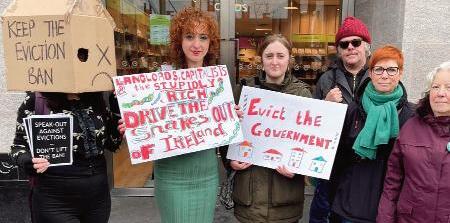
than become homeless. Overholding is not a criminal offense, it just puts you in dispute with your landlord. The information on overholding needs to be promoted, but crucially, networks of solidarity should be built which can stand in solidarity with anyone who chooses to resist their eviction.
A mass housing movement is needed on the streets, in workplaces, colleges and communities to demand a reinstatement of the eviction ban, the conversion of the huge numbers of vacant buildings into public housing and a massive state programme to build public housing on public land.
The trade unions are a key force which could build this movement, with hundreds of thousands of members, many of them hit hard by this crisis.
The government has been weakened by these events, and for many it will underline again that we need Fianna Fáil and Fine Gael out of office. This is essential, but a new government will not bring real change unless it breaks with the capitalist framework which has dictated this government’s approach to housing. In this capitalist system, housing is treated as a commodity for the profit of landlords and developers, not as a human need and right. We need socialist change, bringing the abundant wealth of this tiny elite into democratic public ownership, and using it to provide decent homes for all.
The immense social, political, economic and ecological crises reflect a capitalist system in perpetual crisis. That’s why the Socialist Party stands for revolutionary socialist change, and why we are organising to bring it about. We support every right and reform that can improve life for working-class people while fighting for what’s needed. We say: if capitalism can’t afford to provide for our needs then we can’t afford capitalism.
• Workers need real pay rises. Permanently link all wages to the rate of inflation by law, alongside pay rises to compensate for real pay lost over the last decade of austerity.
• For an immediate increase in the minimum wage to £15 and the removal of all youth exemptions.
• End precarity including ban zero-hour contracts, end bogus self-employment and the reliance on agency staff in the private and public sector. Fight for guaranteed hours with permanent contracts for all workers.
• A four-day work week with no loss of pay.
• Reduce the pension age to 60. A decent guaranteed pension for all.
• No layoffs. Open up the books and take large job-shedding companies into public ownership, under democratic workers’ control and management, with compensation
paid only on the basis of proven need.
• Repeal all anti-trade union laws. For the right to organise and carry out effective action.
• For a fighting trade union movement that organises the unorganised and mobilises the power of its membership. All officials should be elected, subject to recall and live on the wages of the workers they represent.
Housing
• Reduce and freeze rents to an affordable level. Ban evictions.
• For a major programme to expand housing executive stock.Take the big construction companies into public ownership. Seize vacant properties and unused land being hoarded for profit.
• Provide culturally appropriate accommodation for Travellers.
• Nationalise the banks and reduce mortgage payments to affordable levels.
• For a major public works programme to build public schools, hospitals and childcare facilities.
• Defend the NHS: stop and reverse all privatisation and cancel PFI debts. Extend the NHS by taking pharmaceutical companies into democratic public ownership and fully fund mental health services.
• Free publicly-run childcare scheme for every community. Extend fully-paid
parental leave to two years and provide high quality early-years education.
• For 24-hour free counselling services and education programmes to begin to tackle the mental health crisis.
• Free education and training for all. For a fully integrated, non-gender segregated, comprehensive and secular education system and the right to a third-level place for all who want one, with a living grant for all students.
Environment
• For substantial investment in an expanded, reliable and free public transport system.
• End the reliance on fossil fuels — keep them in the ground. For an extensive state investment in renewable energy, retrofitting homes and public buildings, and green jobs.
• For a just transition to a zero carbon economy, with no job losses or regressive carbon taxes.
• Take the fossil fuel companies, big agribusinesses and corporations into democratic public ownership to stop the destruction of our planet for profit.
• Oppose all forms of racism, sexism, homophobia and transphobia.
• For LGBTQ-inclusive, consent-based sex education in schools. Fully fund trans healthcare.
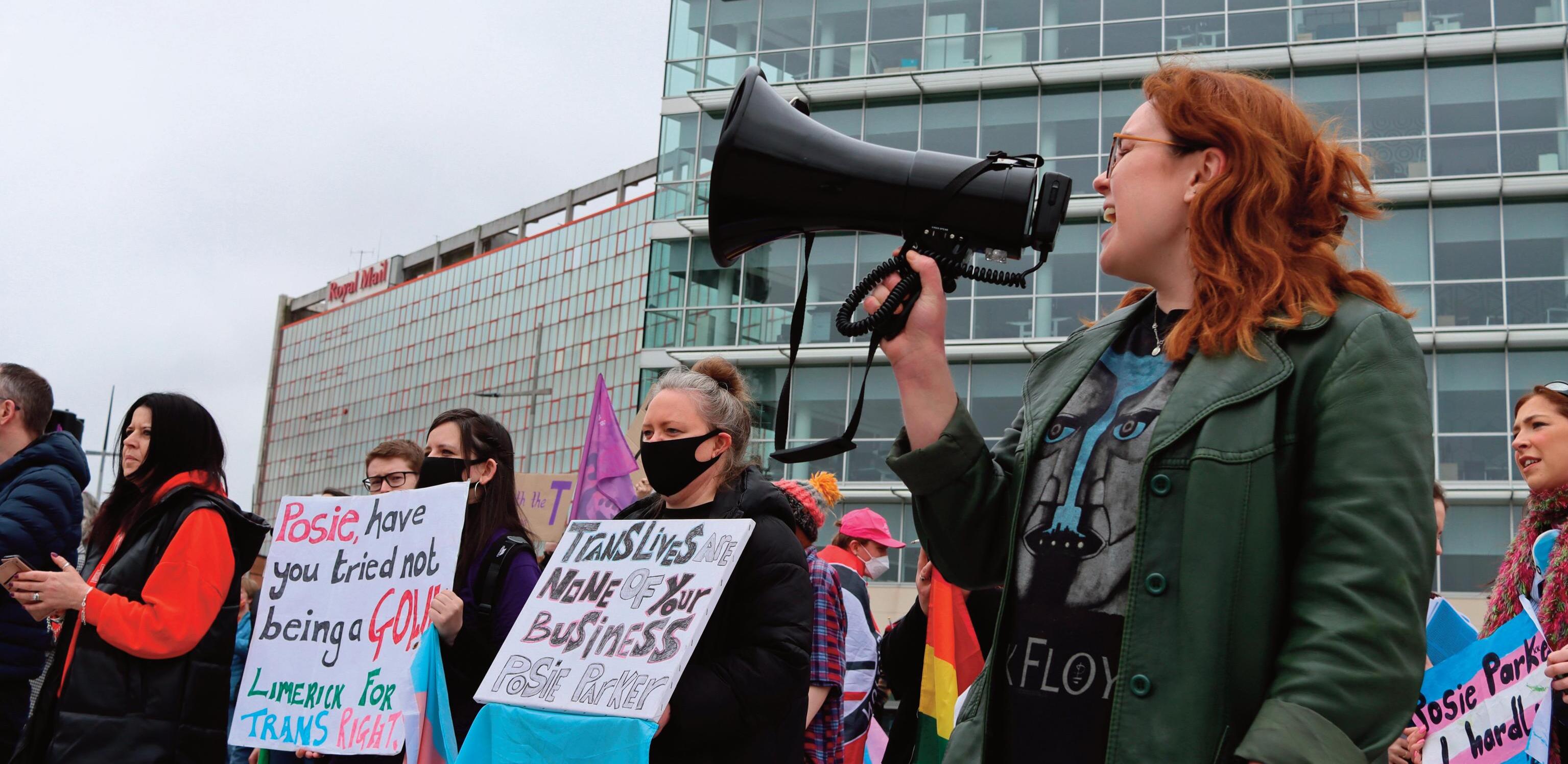
• Reduce the voting age to 16.
• Defend the right to asylum. Shut down detention centres. Abolish all racist immigration laws.
• Black lives matter! Oppose far-right division and organise against racist or LGBTQphobic attacks.
• For fully publicly funded refuge centers for victims of gender-based violence.
• Fight to end gender violence, abuse and harassment in all its forms.
• For a socialist feminist movement that unites the whole working class in the struggle against oppression.
For workers’ unity
• No hardening of borders – north-south or in the Irish Sea.
• For the unity of the working class, Protestant and Catholic, North and South, in opposition to all forms of sectarianism, paramilitarism and state repression.
• Build a new party that can unite workingclass people across the sectarian divide in the spirit of solidarity, compromise and mutual respect.
• For a socialist Ireland, with no coercion and the rights of minorities guaranteed, as part of a free, equal and voluntary socialist federation of Ireland, Scotland, England and Wales, as part of a socialist Europe.
End the rule of the billionaires
• Take the wealth off the 1%. For real progressive taxation on incomes, assets and
profits to fund public services. Stop tax avoidance and evasion by the wealthy.
• Renationalise all privitised services in health, education, transport, postal, housing, energy, sanitation, water and broadband provision.
For socialist change
• Capitalism produces inequality, environmental destruction and war. We need an international struggle against this system.
• Solidarity with the struggles of workers and oppressed peoples internationally.
• Oppose all imperialist powers, wars and occupations. No to NATO and EU militarisation.
• No to a Tory Brexit— oppose all corporate“free trade” agreements and fight for a socialist alternative to the bosses' EU.
• Build a new mass party that organises workers and young people in the struggle against all injustices and for a socialist alternative. For a working-class movement to bring about a left, socialist government that breaks with capitalism.
• Take the key sectors of the economy — the monopolies in banking, industry, services, agriculture and big tech — into public ownership under the democratic control of the working class.
• Replace the capitalist market with a democratic socialist plan for the economy based on the interests of the overwhelming majority of people and the environment.